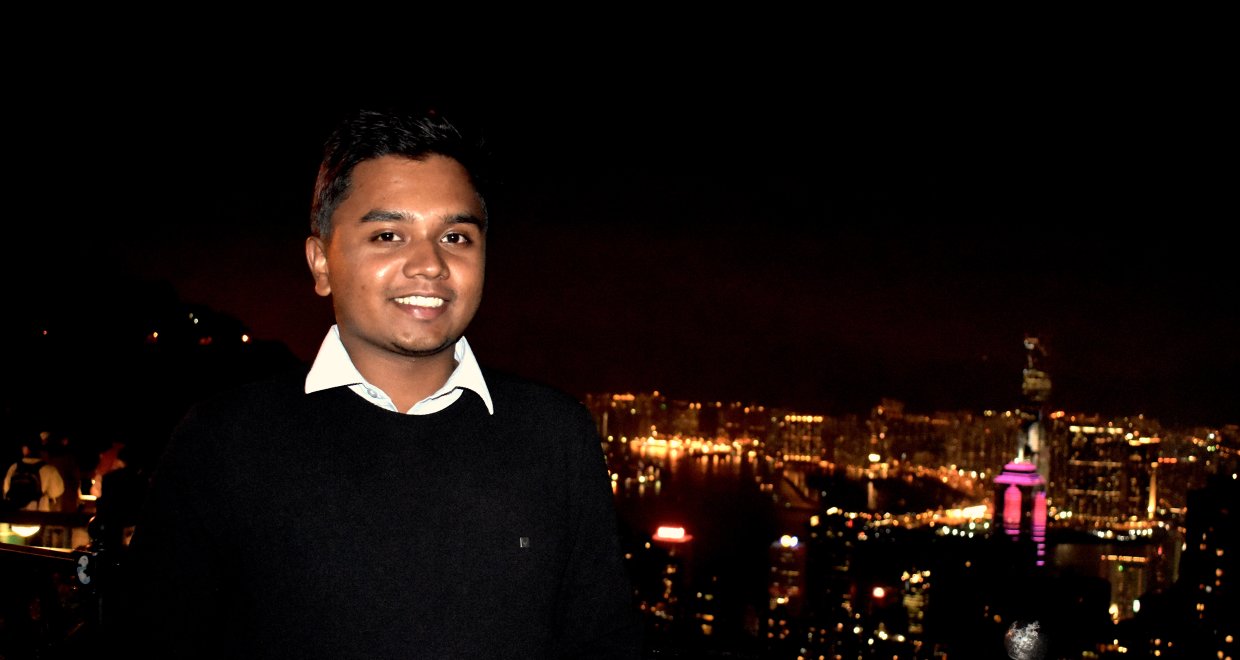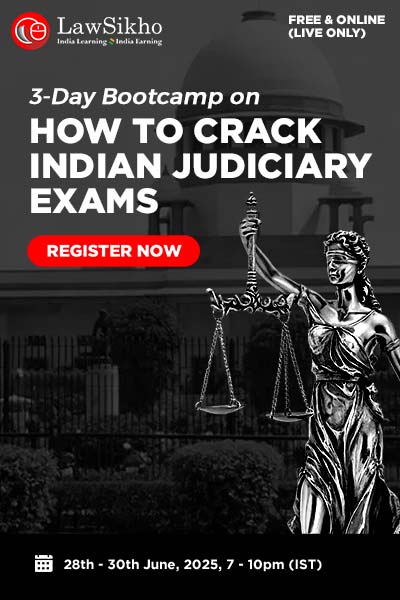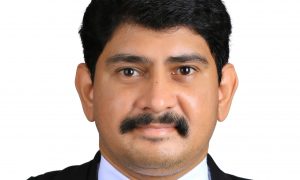Pratik Bakshi graduated from National University of Advanced Legal Studies (NUALS), Kochi in the year 2018. He is currently working as a Business Development Associate with J. Sagar Associates, Gurugram. He has founded several organisations, such as World Law Forum, the Network for International Law Students, and The Union Debates (previously, Indian Union Debate Forum). He is one of the few people working extensively on Business & Human Rights in India and is a member of the Sounding Board of the Hague Rules on Business and Human Rights International Arbitration, a committee working on establishing a system to adjudicate business and human rights disputes through arbitration.
In the past, he has worked with Ram Jethmalani as his PR/Social Media Manager; and advises various law-focused start-ups, including The Negotiation Academy, The European Centre for Career Education etc. Through his latest venture, World Law Forum, he aims to bring a transformation in the world through law. World Law Forum has since its foundation worked on crucial and niche areas, such as Modern Slavery in Australia and Anti-SLAPP Legislation in India.
In this interview, he talks to us about-
- His law school experience at NUALS;
- His internship experiences with Mr Mahesh Jethmalani, Khaitan & Co. and J. Sagar Associates;
- His experience as the founder of Network for International Law Students and World Law Forum;
- Prioritising works in law school;
- His appointment experience as a Business Development Associate with J. Sagar Associates; and
- His opinion about resolving human rights disputes through arbitration.
HOW WOULD YOU LIKE TO INTRODUCE YOURSELF TO OUR READERS? PLEASE SHARE YOUR ACADEMIC AND PROFESSIONAL BACKGROUND.
I like to introduce myself as a lawyer by profession and an entrepreneur by passion. I graduated earlier this year from the National University of Advanced Legal Studies (Kochi) and I am currently working at J. Sagar Associates. Since my first year at law school, I have founded six organisations, half of them were successful and the other half not-so-successful. But I guess, that’s part of being an entrepreneur.
WHY DIDN’T YOU OPT FOR CONVENTIONAL DEGREES IN ENGINEERING OR MEDICINE?
To begin with, I wanted to be an automobile engineer and had made up my mind to develop the next cutting-edge car design and technology. I remember being super-excited when we were about to start our Physics lesson on ‘Torque’ in school. Almost needless to say, I didn’t understand anything, and after a few weeks, I made a conscious decision that it was not my thing. Well then, like many others, I chose law because I didn’t fit in elsewhere. I also heard that law graduates made good money compared to other graduates, so that helped me make my mind a bit as well. Looking back, I would say that it was one of the best decisions that I have ever made in my life.
TELL US A BIT ABOUT YOUR TIME STUDYING LAW AS AN UNDERGRADUATE AT NUALS, COCHIN. ARE THERE ANY MEMORABLE MOMENTS OF LAW SCHOOL, WHICH YOU WOULD LIKE TO SHARE?
When I started law school, there was absolutely nothing to do there. We had classes for six hours till 04:30 in the evening; and the library would shut at about 06:30 if I remember correctly. There was barely any time and resource for the students to take on any extra-curricular or extramural activities. Things changed and became better after a year or so with some positive reforms coming in, but personally, I had already lost hope/interest in whatever goes on in law school. By then I had already started the Network for International Law Students (NILS), which kept me busy. It was a new organisation then, and I was excited to work with students and lawyers from across the world. Then during my third year, I contested for being the Debate Secretary of the law school and lost (by a huge margin, I remember). I was the most experienced in organising debates, or would I believe, but then you know how things work in an election. So, I started another organisation called the Indian Union Debate Forum along with a classmate of mine, who was equally frustrated with the whole high-drama politics that was going on. The idea was to introduce the Oxford/Cambridge Union-styled debates in India. We had our first debate three to four months later and were thrilled by the response that we got. We got Ram Jethmalani, Subramanian Swamy, Manish Tewari, Madhu Kishwar, KTS Tulsi, Pinky Anand among others as speakers and debate against each other – a never seen before the scene in India. So, it was probably the most engaging and exciting period of my law school life.
INTERNSHIPS PROVIDE STUDENTS WITH THEIR FIRST EXPOSURE TO THE PRACTICAL ASPECTS OF THE LEGAL PROFESSION. COULD YOU TELL US ABOUT THE INTERNSHIPS YOU TOOK UP, AND WHAT YOU LEARNT FROM THOSE EXPERIENCES?
Internships are helpful because they help you realise what you are made for. For me, it made me realise that I am certainly not made for transactional law. Of all the internships that I have done, I have enjoyed three of them thoroughly – Mahesh Jethmalani, Khaitan & Co, and J. Sagar Associates. When I was an intern under Mahesh Jethmalani, there wasn’t a lot of work for the interns to be honest, but the aura of watching Jethmalani Jr. in the court and see him argue made up for it. Plus, you got to be involved in all the cases that you see every day in the news, so it was all very exciting. Next up, Khaitan & Co, I was with a great bunch of people and enjoyed all the work that was given to me – primarily disputes matters. And lastly, JSA because it introduced me to the area of business development for law firms in which I am currently involved now.
YOU ARE THE FOUNDER OF THE NETWORK FOR INTERNATIONAL LAW STUDENTS (NILS), A STUDENT-RUN BODY WHICH HAS ITS PRESENCE IN 26 COUNTRIES. COULD YOU PLEASE TELL US A BIT ABOUT THIS ORGANISATION AND WHAT MOTIVATED YOU TO ESTABLISH THIS ORGANISATION?
As said earlier, when I joined law school I always felt that one has to take a lot of his/her own initiative to keep herself engaged. I believe it’s the same with most law schools in India and other developing countries. I started NILS with a focus to provide something to students especially from developing countries to farther the exposure and engaging themselves in activities which otherwise they wouldn’t in their law schools. We did some interesting events and exchange programmes which were highly praised and received wide attention. I was fortunate to come across a bunch of enthusiastic students who believed in my idea and took it to the next level; and as you said correctly, currently we have over 5000 members in 26 countries across all continents, except Antarctica of course.
LATELY, YOU CO-FOUND WORLD LAW FORUM. WHAT STIRRED YOU TO LAUNCH THIS ORGANISATION AND CAN YOU TELL US A BIT ABOUT ITS GOALS?
I was set to retire from NILS in 2018. Many people advised me not to retire as it was my baby, but then I wanted NILS to grow as a democratic organisation, run by and for law students. Therefore, it did not make sense for me to stay there forever, after ceasing to be a law student. I wanted to take my experience to the next level and founded World Law Forum, along with a colleague of mine who I worked briefly in NILS. The idea behind World Law Forum is to engage people in discussions on areas of law which are rarely discussed upon, either because people are not aware of them or because they think they are not important enough. Therefore, the core-topics that we work on are cutting-edge and will be the most relevant topics in the next decade. We organised the first-ever conference on Modern Slavery in Sydney earlier this year, after the Modern Slavery Act coming into force in the New South Wales. In India, we organised India’s first-ever conference on Strategic Lawsuits Against Public Participation (SLAPP), with over 620 participants. Therefore, the areas of our work are generally the “first-ever” or “among the firsts”, and we try to promote such areas of law, which would be relevant in the future. So far we have got a really good response, with eminent people including Head of States, Noble Laureates, Judges and the most eminent lawyers, journalists and academics having attended our event.
Another thing that led to the foundation of World Law Forum is that we felt that the legal profession is a bit isolated and most events organised in the legal sector involve mostly members of the profession and barely from other professions or walks of life. However, the law is something which affects everyone and therefore ours is a platform for people from all walks of life to come together and discuss the law.
WAS IT DIFFICULT FOR YOU TO RUN THESE ORGANISATIONS CONCURRENTLY WITH YOUR LAW SCHOOL WORK? HOW DID YOU MANAGE TO HANDLE BOTH THE WORK SWIFTLY? DID YOU EVER PRIORITISE THESE WORKS OVER YOUR ASSIGNMENTS AT LAW SCHOOL?
It was not difficult at all. Rather, it was the most fun part of my law school. You have to prioritise your work and that’s what I did. There were some subjects in our curriculum that I was not interested in, so they were low on my priority list. While, there were some subjects and professors I really liked, and I focussed on them. And most students in India cover most of the curriculum a couple of nights before the exam, I was part of the same gang. So, it was all good. At least it helped me learn the skill of multitasking which is very essential.
DO YOU FEEL THAT HUMAN RIGHT DISPUTES ACROSS THE GLOBE CAN BE RESOLVED THROUGH ARBITRATION INSTEAD OF COURTS? IS ARBITRATION THE PROPER ADJUDICATORY MECHANISM TO RESOLVE THESE DISPUTES?
I am a member of the Sounding Board of The Hague Rules on Business and Human Rights Arbitration. The Working Group is working on developing this system where Business and Human Rights disputes can be solved via International Arbitration. The Drafting Committee is chaired by Bruno Simma, a former Judge of the International Court of Justice.
So, most of the Business and Human Rights cases arises from countries or regions where the courts and other mechanisms have failed to deliver justice, which can be because of lack of courts or corrupt courts etc. Even where competent courts are available, Arbitration offers an attractive alternative with speedier procedure and awards that are potentially enforceable throughout the world under the New York Convention.
We are often asked why businesses would who are accused of human rights abuses chose to submit the disputes to arbitration. We must understand that today, the consumers have started looking into the business ethics of companies before buying products and have in the recent past seen boycotting of products of companies accused of human rights abuses. Therefore, when a corporation’s reputation is questioned, the management might prefer speedy resolution of the dispute, rather than a lengthy litigation in court. In the case of arbitration, the parties may also choose judges with expertise in Business and Human Rights, rather than submitting the matter to the court where the judge is chosen by “the luck of the draw”. An expeditious and fair hearing would limit the reputation damage and can also help the victims in accessing justice faster and more conveniently.
YOU HAVE WORKED AS PUBLIC RELATIONSHIP MANAGER WITH THE OFFICE OF RAM JETHMALANI AND HAVE BEEN ADVISING THE NEGOTIATION ACADEMY ON ITS BUSINESS EXPANSION. WHEN DID YOU DEVELOP YOUR INTERESTS TOWARDS THESE SORT OF BUSINESS DEVELOPMENT WORKS?
I have known Mr Jethmalani for a while now, as he was the first Patron of NILS. When he resigned from his own newspaper, The Sunday Guardian after an editorial dispute, I suggested that he should consider having his own blog, considering he already has a mass following. He agreed to the idea and I started running his blog/website, and slowly was assigned the task to handle his media accounts. As far as the Negotiation Academy is concerned, I had invited Claudia Winkler to India for a series of workshops on negotiation targeted at law students. Until then, she had mostly trained lawyers; but after seeing the potential in the student market, we decided that an academy on negotiation with a focus on training students would be great. And so, I’ve been involved with the Negotiation Academy from the scratch and advise on the business strategy.
For most of the last five years of my life, I’ve been doing business strategy and development for the different organisations I have been involved with – so my interest in it evolved over the years.
HOW DID YOUR RECRUITMENT TAKE PLACE AT J. SAGAR ASSOCIATES? WHAT DOES A TYPICAL WORKING DAY LOOK LIKE FOR YOU?
I interned with J. Sagar Associates during the final year of my law school and it seemed to be a great place to work for. As I was deciding on what career path should I choose after law school, JSA seemed to be a great stepping stone as I had always admired the principles on which the firm has been founded – of being democratic and providing equal opportunity to everyone; which is a rare sight in the legal industry in India. And so, I showed my interest to have a permanent position in the firm and after sending my CV etc, and I was selected to work for the firm.
I am responsible for the submissions that the firm makes to different journals, improving market-visibility, working on proposals and pitches, analysing the business of peer law firms, identifying conferences and events which the firm can participate in, and forming other marketing and branding strategies.
DO YOU THINK YOU LAW DEGREE PROVIDES YOU WITH AN EDGE IN PURSUING YOUR WORK AT J. SAGAR ASSOCIATES?
The work at the firm is not directly related to law, but then having studied law always provides you with an edge, since it takes you considerably lesser effort in understanding how a law firm works, what visibility is essential for a law firm and what do the clients look for.
PLEASE SHARE SOME ADVICE TO YOUNG LAW STUDENTS WHO WISH TO HAVE A CAREER IN ENTREPRENEURSHIP?
I have always followed the principle of ‘Zero to One’ by Peter Theil, which basically means that to be successful in entrepreneurship, you must be the first in the market. If you are just copying someone else or trying to do what already exists in the market, you are only one in the ‘n’ number of competitors. While if you’re coming with an innovative product or service, you are the only one in the market, you get the first-movers advantage and almost enjoy a monopoly till someone else comes up. Therefore, to be successful in long-term, you must be innovative and work on something which is missing in the market; or provide an out-of-the-world perspective/angle to an existing product or service. This applies to all sectors. Even for law firms, one must show how one’s firm is different from its peer law firms. So, you need to find your USP and start working on it at the earliest. Don’t overthink – just go with the flow. You may want to make your Plan A and Plan B, but in entrepreneurship, mere Plan B is not enough, and you might need to plan yourself until Plan Z or even further. But as you start working on it, you learn to improvise and move on. Patience is supremely important. Don’t worry about funding because if you have a solid plan/idea, money would come in from one side or the other. And the best time to start working on it is while you are studying because there’s not much at stake, you have more time and can take risks.
WHERE DO YOU SEE YOURSELF TEN YEARS FROM NOW?
It’s a tough question. I don’t generally think that far away. But I would say I see myself as an entrepreneur who has brought at least something valuable to the world. Ticked off my bucket list. Maybe, politics? But I know that I would be a really bad fit in there.
WHAT WOULD BE YOUR PARTING MESSAGE TO OUR READERS WHO ARE PRIMARILY LAW STUDENTS AND YOUNG LAWYERS?
Work towards what defines you. Just because you went to law school does not mean you have to be a lawyer. There are so many more opportunities out there if you can convince yourself that it is worth that tiny risk. Parents are always harder to convince, but then they will be convinced in a few months if they see you making a living and happy with what you are doing.


























